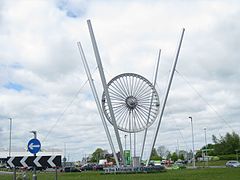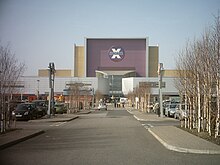Glasshoughton is a neighbourhood of Castleford in the Wakefield district of West Yorkshire, England. The area is next to Junction 32 of the M62 motorway and the Glasshoughton railway station, and borders Pontefract.
| Glasshoughton | |
|---|---|
 Glasshoughton Wheel of Light | |
Location within West Yorkshire | |
| Metropolitan borough | |
| Metropolitan county | |
| Region | |
| Country | England |
| Sovereign state | United Kingdom |
| Post town | CASTLEFORD |
| Postcode district | WF10 |
| Dialling code | 01977 |
| Police | West Yorkshire |
| Fire | West Yorkshire |
| Ambulance | Yorkshire |
| UK Parliament | |

Glasshoughton is home to the Xscape leisure centre and ski slope, the Junction 32 Outlet Shopping Village, a B&Q, a hotel, several pubs and a number of fast food restaurants, which were built on the site of the former Glasshoughton Colliery and coke coking plant.[1] This area also contains the Glasshoughton Wheel of Light, a former pit winding wheel now made into a sculpture as a memorial to the miners of Glasshoughton.[2] It is also home to the Castleford Campus of Wakefield College.
The local football team is Glasshoughton Welfare F.C., for whom former Liverpool F.C. goalkeeper, Bruce Grobbelaar made one fund-raising appearance in 2007.
For elections to Wakefield Council, it is in the Castleford Central and Glasshoughton electoral ward.
History
editFor most of the nineteenth century Glasshoughton was a separate village with an economic, social and religious life of its own. It had glassworks before Castleford and it supplied most of the coal for Castleford's industries until the big, modern pits opened at Wheldale, Fryston and Glasshoughton itself from the late 1860s. There was a Wesleyan chapel in the village from not much later than 1837, this being the year a plot of land on what is now School Lane was sold for "a Methodist Chapel and Sunday School".[3] In the 1851 census the village name was sometimes spelled Glashouton.[4] In the 1870s, the locale was well known as Houghton-Glass for its mines and quarries, producing excellent limestone and excellent sand used by glassmakers and iron foundries.[5] The 1890 Ordnance Survey map shows Glass Houghton as a village distinct from Castleford, with its largest buildings along each side of Front Street. The population growth of Castleford to the southwest of the old village centre naturally has been referred to as Glasshoughton.
Houghton-Glass was formerly a township in the parish of Castleford,[6] in 1866 Glass Houghton became a separate civil parish,[7] on 1 April 1938 the parish was abolished and merged with Castleford.[8] In 1931 the parish had a population of 8602.[9]
The major developments on the budding community in the twentieth century were related to growing prosperity due to the growth of technological innovation. Efficiencies in communications led to the growth and political consolidation of the surrounding communities. The vehicular bypass named Colorado Way was realised.
Glasshoughton railway station on the Pontefract Line opened in 2005 to serve the newly built leisure and retail facilities. The station encourages "park and ride" and "walk and ride" commuting to reduce road congestion.
References
edit- ^ "Glasshoughton". Waystone. Retrieved 24 December 2015.
- ^ Wheel of Light a shining tribute to mining history Yorkshire Evening Post 7 December 2005. Retrieved 29 April 2017.
- ^ "A True Phenomenon". Retrieved 15 September 2015.
- ^ "1851 England Census". Retrieved 15 September 2015.
Page showing alternate spelling of Glass Houghton
- ^ "A Vision of Britain: Glass Houghton in West Riding". Retrieved 15 September 2015.
- ^ "History of Glass Houghton, in Wakefield and West Riding". A Vision of Britain through Time. Retrieved 9 October 2024.
- ^ "Relationships and changes Glass Houghton CP/Tn through time". A Vision of Britain through Time. Retrieved 9 October 2024.
- ^ "Pontefract Registration District". UKBMD. Retrieved 9 October 2024.
- ^ "Population statistics Glass Houghton CP/Tn through time". A Vision of Britain through Time. Retrieved 9 October 2024.
